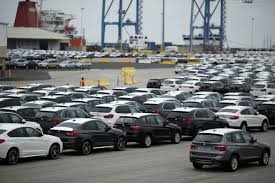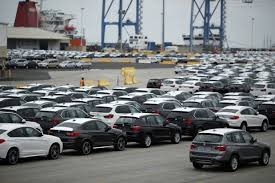
According to media reports, a host of countries including Mexico, Canada, the European Union, South Korea and Japan are set to hold deliberations in Geneva next week over measures that can be taken to tackle the threatened imposition of tariffs on import of autos and car parts by the U.S. President Donald Trump.
Automakers, foreign governments and others have severely criticized the Trump administration over the threat because auto sales and global industry jobs would be hurt by the imposition of tariffs that could be as much as 25 per cent.
Mutual fears are being discussed with each other by a number of auto manufacturing countries in recent days. There are also discussions being held about a potential coordinated measure against Trump’s “Section 232” investigation which is investigating whether importing cars and auto parts into the US poses a threat to its national security and this investigation was ordered in May by Trump.
Even though similar investigations that were ordered last year took 10 months to completed and resulted in tariffs on imported steel and aluminum, many are predicting the auto investigation could be over within weeks. Following the beginning of such an investigation, a 270 day period is the norm for the Commerce Department to offer recommendations to the president.
The kind of response that the countries might be considering is not yet clear, even though retaliatory tariffs of their own have bene imposed on American goods by Canada, the EU and Mexico, following the import tariffs on steel and aluminum by Trump in March. Another option is to fight the United States at the World Trade Organization (WTO).
According to a Canadian official and a Mexican official quoted in the media, deputy ministers will gather in Geneva on July 31 to hear each other’s views.
“The meeting is meant to bring together major auto producing nations so we can discuss our concerns over the U.S. Department of Commerce’s Section 232 investigation of automobiles and parts,” the Canadian government official reportedly told the media.
Mexico’s economy ministry said that its Deputy Economy Minister Juan Carlos Baker would be travelling to Geneva for “work meetings about several subjects,” which also included a meeting with the World Trade Organization (WTO) chief Roberto Azevedo. ‘
The WTO website states that following the meeting of with Baker on Monday, he would also meet Canada’s Deputy Trade Minister Timothy Sargent and Japan’s Senior Deputy Foreign Minister Kazuyuki Yamazaki on Tuesday.
South Korea’s Hyundai Motor Co, Japan’s Toyota Motor Corp and Germany’s BMW, in addition to international manufacturing units of U.S. brands General Motors Co, Ford Motor Co, and Fiat Chrysler Automobiles NV would be impacted by the auto tariffs is they are imposed.
Some of the fears have bene temporarily eased after Trump agreed on Wednesday last week not to impose car tariffs on the EU against the EU reducing the trade barriers for US goods and services in the block. However, the ultimate decision on the issue would not be available till the completion of the security investigation in coming months.
(Source:www.reuters.com)
Automakers, foreign governments and others have severely criticized the Trump administration over the threat because auto sales and global industry jobs would be hurt by the imposition of tariffs that could be as much as 25 per cent.
Mutual fears are being discussed with each other by a number of auto manufacturing countries in recent days. There are also discussions being held about a potential coordinated measure against Trump’s “Section 232” investigation which is investigating whether importing cars and auto parts into the US poses a threat to its national security and this investigation was ordered in May by Trump.
Even though similar investigations that were ordered last year took 10 months to completed and resulted in tariffs on imported steel and aluminum, many are predicting the auto investigation could be over within weeks. Following the beginning of such an investigation, a 270 day period is the norm for the Commerce Department to offer recommendations to the president.
The kind of response that the countries might be considering is not yet clear, even though retaliatory tariffs of their own have bene imposed on American goods by Canada, the EU and Mexico, following the import tariffs on steel and aluminum by Trump in March. Another option is to fight the United States at the World Trade Organization (WTO).
According to a Canadian official and a Mexican official quoted in the media, deputy ministers will gather in Geneva on July 31 to hear each other’s views.
“The meeting is meant to bring together major auto producing nations so we can discuss our concerns over the U.S. Department of Commerce’s Section 232 investigation of automobiles and parts,” the Canadian government official reportedly told the media.
Mexico’s economy ministry said that its Deputy Economy Minister Juan Carlos Baker would be travelling to Geneva for “work meetings about several subjects,” which also included a meeting with the World Trade Organization (WTO) chief Roberto Azevedo. ‘
The WTO website states that following the meeting of with Baker on Monday, he would also meet Canada’s Deputy Trade Minister Timothy Sargent and Japan’s Senior Deputy Foreign Minister Kazuyuki Yamazaki on Tuesday.
South Korea’s Hyundai Motor Co, Japan’s Toyota Motor Corp and Germany’s BMW, in addition to international manufacturing units of U.S. brands General Motors Co, Ford Motor Co, and Fiat Chrysler Automobiles NV would be impacted by the auto tariffs is they are imposed.
Some of the fears have bene temporarily eased after Trump agreed on Wednesday last week not to impose car tariffs on the EU against the EU reducing the trade barriers for US goods and services in the block. However, the ultimate decision on the issue would not be available till the completion of the security investigation in coming months.
(Source:www.reuters.com)














